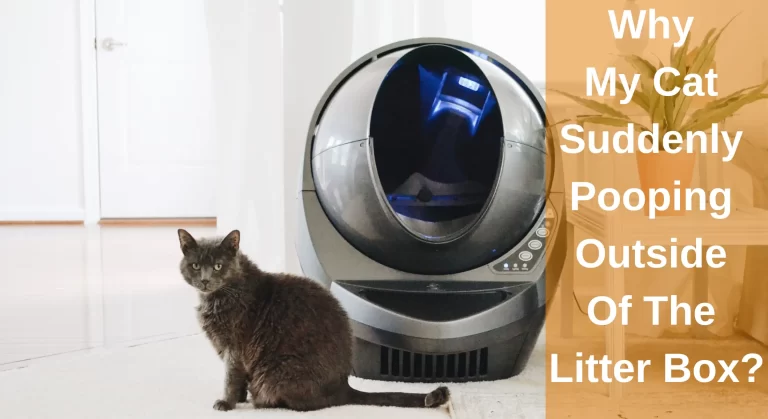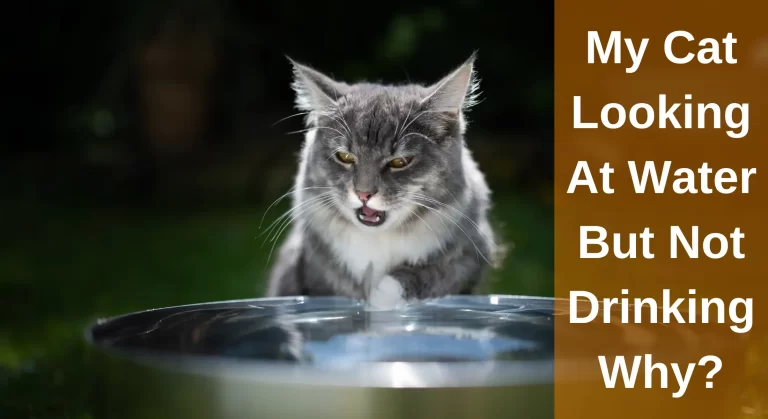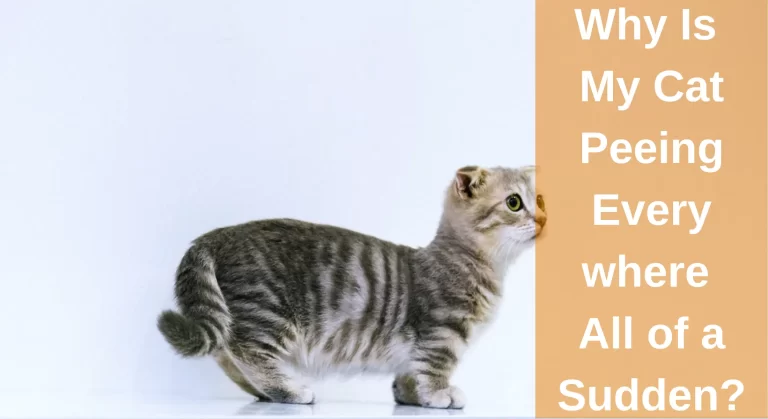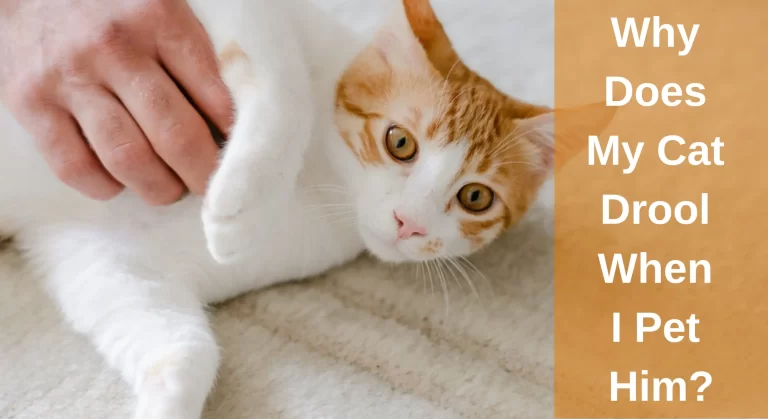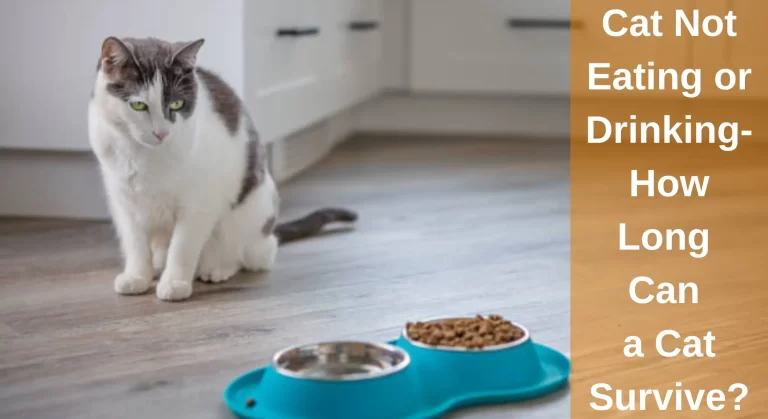Why Do Cats Scratch The Sides Of The Litter Box? All You Need To Know
Many cats are just like washroom ninjas; they usually ensure that nothing is seen when they use the bathroom. However, if your cats are like mine, going to the toilet becomes more of a spectacle. They only need to cover their feces heavily and scrape every surface of their own litter box so that everyone understands what they’re doing.
But most people frequently ask Why Do Cats Scratch The Sides Of The Litter Box?
Some cats may start clawing the edges of the litter box to hide their feces if there is insufficient litter. To get rid of any filth on their claws, your cat may sometimes claw the edges of their litter box.
If you are worried about this strange behavior of your cat, then this article will help you understand all the possible reasons behind this behavior.
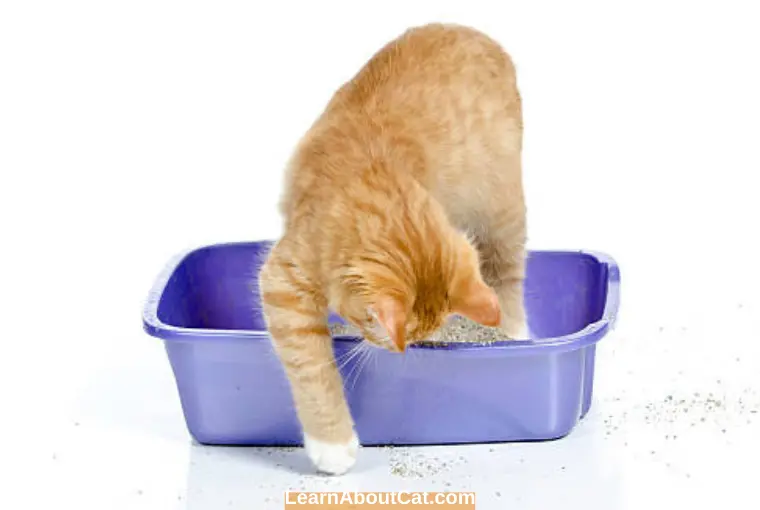
Understanding Cat Behavior
Before diving into the reasons why cats scratch the sides of the litter box, it is important to understand their behavior in general. Scratching is a natural behavior for cats to scratch and serves many purposes.
It helps cats mark their territory, stretch their muscles, and keep their claws sharp and healthy. Additionally, cats have a strong instinct to bury their waste, so litter boxes are so important for indoor cats.
Why is My Cat Scratching Litter Box Excessively?
When extreme litter box clawing occurs, it may not always be natural, and there may be an issue. Examine the cat’s litter box surroundings first because any of these areas may be the cause of the frequent scratching.

Environmental Factors That Can Cause Excessive Scratching
While health issues are a common cause of excessive scratching, there are also environmental factors that can contribute to this behavior.
- Dirty Litter Box: One potential cause is a dirty litter box. Cats are fastidious creatures and prefer to use a clean litter box. If the litter box is not cleaned regularly, it can become dirty and unpleasant for the cat to use, leading to excessive scratching.
- Type of Litter: Another environmental factor contributing to excessive scratching is the type of litter used. Cats have preferences for litter, and some may not like the texture or scent of certain types of litter. Try switching litter types if your cat scratches excessively in their litter box.
- Litter Quantity: A thickness of three inches is usually advised for cats. While you would believe that adding more litter will stop scratching, that is not true. Many cats might not utilize an overloaded litter box. To provide the cat with enough litter to dig about in, keep the litter’s layer should be at least three inches.
- Litter Box Dimensions: Generally speaking, your cat’s litter box needs to be around 1.5 times as large as they are. A very small one could cause excessive itching.
- Location: Make sure the cat’s litter box is placed in a quiet, private spot that isn’t too busy with people. Generally, a restroom is the best location, but make sure it isn’t closed off for extended periods. Your cat could utilize another area of your home as a washroom if she didn’t get to its litter box.
Addressing Excessive Scratching: If your cat is healthy but still scratching excessively, consider environmental factors. Your cat’s litter box should be clean, and you should use a litter your cat enjoys. You may also want to try providing additional litter boxes throughout your home, as some cats prefer options.
Health Issues That Can Cause Excessive Scratching
Your cat may be experiencing an underlying health problem if it excessively scratches its litter box.
- Urinary Tract Infection(UTI): One common health issue is a urinary tract infection. Cats with urinary tract infections may feel the urge to urinate more frequently and may experience pain or discomfort when using the litter box. This can lead to excessive scratching as the cat tries to relieve the discomfort.
- Feline Lower Urinary Tract Disease (FLUTD): Another potential health issue that can cause excessive scratching is feline lower urinary tract disease (FLUTD). Pain and difficulty urinating can occur due to inflammation of the bladder and urethra. Cats with FLUTD may scratch excessively as they try to find a comfortable position to use the litter box.
Addressing Excessive Scratching: One of the first things to do is to rule out any underlying health issues. Take your cat to the vet to be checked for urinary tract infections or other health problems. If your cat is diagnosed with a health issue, your vet can provide treatment options to address the problem.
Also Read: My Cat Keeps Going to the Litter Box But Nothing Happens!
Why Does My Cat Scratch The Sides Of The Litter Box? Reasons
Following are the major reasons why cats scratch the edges of the litter box:

1. To Hide Their Feces
If you are a newbie cat owner, it could seem unusual that your cat digs in the litter, but this activity is normal and a result of their innate instincts. They have developed this ingrained survival strategy to prevent predators from finding them.
If there is more litter inside the container, your cat could not be as likely to be able to scratch the actual box.
2. Paw Cleaning
Some cats haphazardly scratch the edges of the litterbox, but other cats employ this clever technique to remove litter particles that unintentionally get caught in their paws.
Several cats rub their sides daily, while others only do it occasionally, such as when they are filthy or when they have diarrhea.
3. Fun Activity
It may shock people to notice the cat causing trouble, particularly if you have just finished cleaning it or replaced the litter. My cats often playfully rolled about in the brand-new litter when they were kittens, which was adorable but also a little nasty.
Considering that this box is both a secure location and an area that is heavily perfumed with their odor, it makes sense that kittens would engage in this behavior.
But if they’re feeling very fun, some cats may engage in this mischievous behavior of clawing the edges and bottom of the entire litter box.
4. To Declare Their Area Boundary (Territorial marking)
Territorial marking by your cat may also be the cause of clawing the edges of the litterbox. Unneutered cats who share their house and litter box with several other cats may exhibit this behavior frequently.
Paw pads of cats contain glands that release their aroma when they rub, claw the sofa, or scrape the edges of the litter box. These glands released scents when cats claimed their territory.
Check Out: Litter Box Ideas for Multiple Cats – Top Solutions
5. Venting Frustration
Cats may also scratch the sides of their litter box when they are feeling frustrated or stressed. This behavior may be a way for cats to release pent-up energy and anxiety.
6. Attention-Seeking Behavior
Finally, some cats may scratch the sides of their litter box as a way to get attention from their owners.
A cat who doesn’t get enough interaction or playtime with its owners may exhibit this behavior more frequently.
Why Does My Cat Scratch the Litterbox After Using It?
If a cat scratches the litter box immediately after utilizing it, he may have a medical issue. Continuous clawing inside the litter box may be an innocent habit, but it may also be a sign of a more serious problem.
Observe your cat’s potty habits because of this. Simply put, the cat’s feces may bring constant scratching. Different cats have their own frequency of second meals.
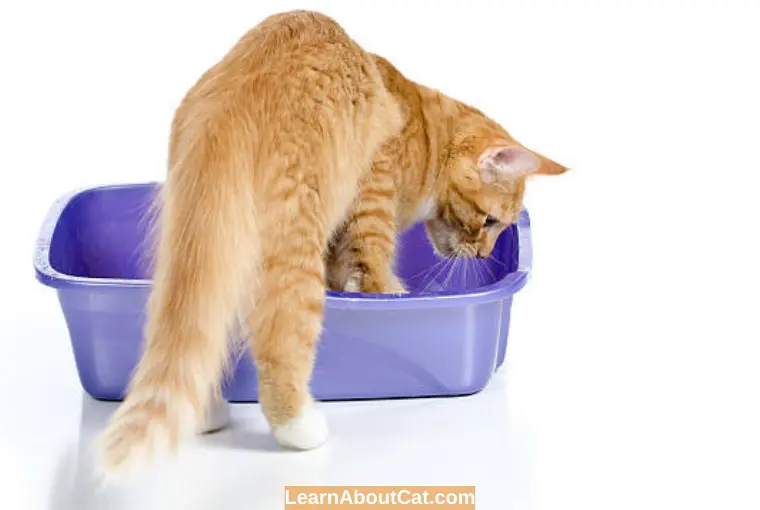
However, a meal once or twice a day is normal. The consistency of the cat’s waste is also very important, so pay close attention when you sweep and properly inspect them.
A healthy individual should have dark brown feces that are neither too soft nor solid. If feces are hard, runny, or have blood in them, this may be a sign of an underlying problem.
Also, Check Out: Why Does My Cat Meow Loudly After Using the Litter Box?
Why Does My Cat Scratch the Litterbox Instead of the Litter?
Cats start scratching the box if the litter is smelly and not clean. It’s likely that the cat won’t appreciate scented litter, even though it could keep the cat’s litter box smelling fresh.
The constant clawing of the litter box is likely a symptom that cats dislike the scent or texture of the litter. Sometimes cats could even stop utilizing it and start popping elsewhere inside the house.
While enclosed litter boxes offer more privacy, the cat could think they smell worse. Since it is an enclosed space, the grade of the material used to make the litter box and how frequently the litter box is cleaned overall have an effect.
Interesting Reading: What Can I Use Instead Of Cat Litter?
Why is My Cat Digging in the Litter box and Not Pooping?
There are several reasons why a cat may dig in the litter box but not actually use the bathroom. One possible reason is that the litter box may not be clean enough for their liking.
Cats are very particular about cleanliness and may avoid using a litter box if it’s not clean enough for them. You could also suspect that your cat has constipation or other issues with its gastrointestinal tract. If this behavior persists, you should consult your veterinarian to rule out medical problems.
Why Does My Cat Scratch The Edge of Litterbox?
This may occur if a container has not been cleaned promptly or if a cat has diarrhea. In such case, keep an eye on the cat’s condition to see whether they need any medical assistance. To assist them in cleaning up, you may also offer them a shower or some wipes made for cats.
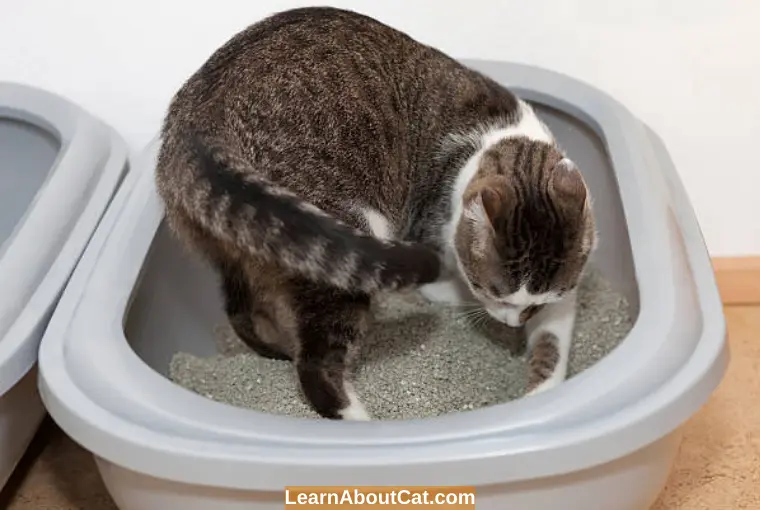
Clawing or scratching is an instinctive, natural behavior that you do not want to stop completely.
Instead, you should concentrate on encouraging the cat to claw acceptable objects, like a scratching post, to stop them from scratching the Wall After Using the Litter Box.
Why Does My Cat Scratch The Wall After Using the Litter Box?
Most cat owners complain that their cats scratch the walls after using the little box. The main reasons behind this behavior are explained as follows:
- They may show this natural behavior to hide the mess they’ve made or to mark their dominance.
- Moreover, they may scratch the walls to show their irritation that they want to remove litter that has been lodged in their feet.
- Another reason is that your cat is trying to communicate with you and tell you that he’s unhappy with its litter box; because it may become full of dirt.
What To Do When Your Cat Is Scratching the Sides of The Litter Box Excessively?
Since we have learned at this point, it’s totally normal for cats to hide their feces, and you may notice them scratching at the litter and maybe the edges of the box throughout this activity.
However, if you see your cat engaging in this activity frequently, it may be something to investigate and address appropriately.

1. Provide a Scratching Post
You should provide your cat with an alternative scratching surface so they won’t scratch the sides of the litter box. A scratching post or pad can help satisfy their urge to scratch and keep their claws healthy.
2. Use a Larger Litter Box
If your cat is scratching the sides of the litter box because it feels too small or cramped, consider upgrading to a larger litter box. This will give your cat more room to move around and bury its waste.
The length, breed, and fitness of your valued companion will all play a role in selecting the best litter box for them. Choose a box that has enough space for your cat.
3. Keep the Litter Box Clean
As mentioned earlier, cats may scratch the sides of the litter box if it is not clean enough. Make sure to scoop the litter box daily and clean it thoroughly regularly.
It’s crucial to provide them with a stress-free bathroom surrounding, which may be accomplished by putting the litter box in an infrequently area.
4. Experiment with Different Types of Litter
The type of litter your cat prefers may vary, so it is worth trying a few different types to find out what he prefers.
The preferences of your cat should also be considered. Fragrant litter may seem the best option for you, but your cat may not like it. Your clever cat may be notifying you that such jasmine or summer breeze aroma isn’t appealing to them by repeatedly clawing the edges of the litter box.
The next phase would be to search for any more hints or indications of discomfort that might have contributed to the cat’s frequent clawing once you’ve confirmed that the litter box meets his or her criteria.
The type of litter your cat prefers may vary, from clumping litter to litter made of various materials (unscented litter—wood pellets, silica micro granules, and non-clumping clay granules).
Frequently Asked Question
Why does my cat dig in the litter box for so long?
This is due to their innate desire to hide their waste and urine with litter. There is an even more primitive explanation as well. Cats are highly clean animals, and this is consistent with that sort of cat behavior.
Why do cats scratch walls after pooping?
Cats claw the walls after using the toilets to hide their feces or mark their territory. Additionally, scratching the litter box after pooping could be a way for your cat to clean their paws.
Why is my cat digging in the litter box and not pooping?
There are several reasons why a cat may dig in the litter box but not use the bathroom. One possible reason is that the litter box may not be clean enough for their liking.
Cats are very particular about cleanliness and may avoid using a litter box if it’s not clean enough. You could also suspect that your cat has constipation or other issues with its gastrointestinal tract. If this behavior persists, you should consult your veterinarian to rule out medical problems.
Why does my cat scratch the floor after eating?
It is similar to hiding feces. When there is excess food available for cats, they might want to bury the food left after eating on the floor so that the owner might not be able to see this leftover food.
Should I punish my cat for scratching the sides of the litter box?
No, punishing your cat for scratching the sides of the litter box can be counterproductive and may worsen the behavior. Instead, focus on providing a suitable litter box and minimizing mess.
Can stress cause a cat to scratch the sides of the litter box?
Yes, stress can be a trigger for this behavior. If you notice your cat scratching the sides of the litter box more frequently, it’s important to identify and address the source of their stress.
Wrap Up!
Even though the noise of the cat scratching the side of the litter box might annoy you, there usually isn’t anything to worry about. Your cat may be doing this to mark her territory, leave her scent, or preserve the health of her paws.
Bring the cat to a vet for a thorough examination if clawing is also followed by signs like tiredness or excessive urination, which might be signs of anxiety or fear.
Related Posts:
Who is Isabella?
My name is Isabella, and I am a dedicated and knowledgeable cat enthusiast. With years of experience caring for cats and a deep love for felines, I made a mission to help other cat lovers navigate the challenges of cat ownership.

